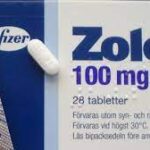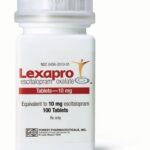What Are The Most Common Side Effects Of Lexapro?

Lexapro is a brand of escitalopram used to treat depression and anxiety. It works by helping to restore the balance of a certain natural substance (serotonin) in the brain. Escitalopram belongs to a class of drugs known as selective serotonin reuptake inhibitors (SSRI). It may improve your energy level and feelings of well-being and decrease nervousness.
Lexapro has been commercially available in the US since its original launch in 2002, and has been prescribed to more than 18 million US adults for depression, anxiety or both. Forest licensed Lexapro from the Danish pharmaceutical company, Lundbeck when the drug was in the clinical stage.
How does Lexapro work?
Lexapro is one of a group of antidepressants called selective serotonin reuptake inhibitors, or SSRIs. These medicines are thought to work by increasing the levels of a mood-enhancing chemical called serotonin in the brain.
How should Lexapro be used?
Lexapro comes as a tablet and a solution (liquid) to take by mouth. It is usually taken once a day with or without food. To help you remember to take Lexapro, take it at around the same time every day, in the morning or in the evening. Follow the directions on your prescription label carefully, and ask your doctor or pharmacist to explain any part you do not understand. Take Lexapro exactly as directed. Do not take more or less of it or take it more often than prescribed by your doctor.
Your doctor may start you on a low dose of Lexapro and increase your dose after 1 week. It may take 1 to 4 weeks or longer before you feel the full benefit of Lexapro. Continue to take Lexapro even if you feel well. Do not stop taking Lexapro without talking to your doctor. If you suddenly stop taking Lexapro, you may experience withdrawal symptoms such as mood changes, irritability, agitation, nausea, dizziness, burning, numbness, or tingling in the hands or feet, anxiety, confusion, headache, sweating, tiredness, and difficulty falling asleep or staying asleep. Your doctor will probably decrease your dose gradually.
What are the most common side effects of Lexapro?
The common side effects of Lexapro include:
- headache
- nausea
- diarrhea
- dry mouth
- increased sweating
- feeling nervous
- restless
- fatigue, or having trouble sleeping (insomnia).
Lexapro may cause side effects. Tell your doctor if any of these symptoms are severe or do not go away:
- nausea
- diarrhea
- constipation
- changes in sex drive or ability
- drowsiness
- increased sweating
- dizziness
- heartburn
- stomach pain
- excessive tiredness
- dry mouth
- decreased appetite
- weight loss
- flu-like symptoms
- runny nose
- sneezing
Some side effects can be serious. If you experience either of the following symptoms, call your doctor immediately:
- unusual excitement
- seeing things or hearing voices that do not exist (hallucinating)
- rash
- hives or blisters
- itching
- fever
- joint pain
- swelling of the face, throat, tongue, lips, or eyes
- fever, sweating, confusion, fast or irregular heartbeat, severe muscle stiffness or twitching, agitation, hallucinations, loss of coordination, nausea, vomiting, or diarrhea
- abnormal bleeding or bruising
- headache
- unsteadiness
- problems with thinking, concentration, or memory
- seizures
Lexapro may cause other side effects. Call your doctor if you have any unusual problems while taking this medication.
Lexapro Safety Information
You should not use Lexapro if you also take pimozide or citalopram (Celexa).
Do not use Lexapro within 14 days before or 14 days after you have used an MAO inhibitor, such as isocarboxazid, linezolid, methylene blue injection, phenelzine, rasagiline, selegiline, or tranylcypromine.
Some young people have thoughts about suicide when first taking an antidepressant. Stay alert to changes in your mood or symptoms. Report any new or worsening symptoms to your doctor.
Seek medical attention right away if you have symptoms of serotonin syndrome, such as: agitation, hallucinations, fever, sweating, shivering, fast heart rate, muscle stiffness, twitching, loss of coordination, nausea, vomiting, or diarrhea. Do not give Lexapro to anyone under 12 years. For More Information Visit: How Long Does It Take For Lexapro To Work





